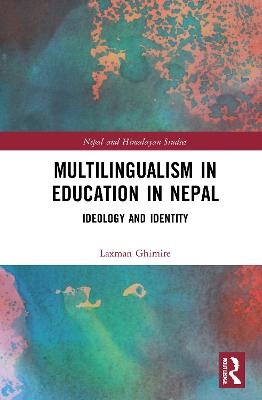
Multilingualism in Education in Nepal
Ideology and Identity
Seiten
2021
Routledge India (Verlag)
978-0-367-68222-4 (ISBN)
Routledge India (Verlag)
978-0-367-68222-4 (ISBN)
This book explores the development of multilingual policy in education in Nepal in socio-political and historical contexts and examines the frameworks of language use in schools.
This book explores the development of multilingual policy in education in Nepal in sociopolitical and historical contexts and examines the frameworks of language use in schools. It investigates the dynamics and factors that influence the process of construction and appropriation of the policy of multilingualism in education. The book surveys the language situation in schools and discusses how it is impacted by local language positions, societal power relations, ideological and identity contestations, and the attitude, language behaviour and resistance of key actors. It highlights the role of pedagogy, linguistics and politics that govern the policy of multilingual education. The author assesses the prospects of a multilingual approach to learning via teacher preparation, curriculum and learning material development, coordination of actors and institutions, and resources available in schools. The book presents Nepal’s linguistic background while discussing how multilingualism in education recognises local languages to improve the quality of learning in classrooms in ethnolinguistic communities. Evaluating the use of local languages in classrooms, it explores monolingual, multilingual and language maintenance frameworks of multilingualism in education.
This book will be of interest to teachers, students, and researchers of education and educational studies, linguistics, sociology of education, school education, language studies, sociolinguistics, language policy and planning, public administration, ethnolinguistics, and sociology of language. It will also be useful to educationists, policymakers, linguists, sociolinguists and those working in related areas.
This book explores the development of multilingual policy in education in Nepal in sociopolitical and historical contexts and examines the frameworks of language use in schools. It investigates the dynamics and factors that influence the process of construction and appropriation of the policy of multilingualism in education. The book surveys the language situation in schools and discusses how it is impacted by local language positions, societal power relations, ideological and identity contestations, and the attitude, language behaviour and resistance of key actors. It highlights the role of pedagogy, linguistics and politics that govern the policy of multilingual education. The author assesses the prospects of a multilingual approach to learning via teacher preparation, curriculum and learning material development, coordination of actors and institutions, and resources available in schools. The book presents Nepal’s linguistic background while discussing how multilingualism in education recognises local languages to improve the quality of learning in classrooms in ethnolinguistic communities. Evaluating the use of local languages in classrooms, it explores monolingual, multilingual and language maintenance frameworks of multilingualism in education.
This book will be of interest to teachers, students, and researchers of education and educational studies, linguistics, sociology of education, school education, language studies, sociolinguistics, language policy and planning, public administration, ethnolinguistics, and sociology of language. It will also be useful to educationists, policymakers, linguists, sociolinguists and those working in related areas.
Laxman Ghimire is an independent researcher in language policy, multilingualism and minority languages in education and has a PhD in Linguistics. He was previously part of the faculty at the Central Department of Linguistics, Tribhuvan University, Nepal and was an independent researcher at UNESCO, Bangkok. He has published several articles in journals and has been involved in the documentation of minority languages of Nepal.
Introduction
1. Dynamics of multilingualism in education
2. Language policies in education
3. Historical development of the policy
4. Language situation in schools
5. Policy appropriation in local context
6. Assessment of the policy
Conclusion
References
| Erscheinungsdatum | 28.07.2021 |
|---|---|
| Reihe/Serie | Nepal and Himalayan Studies |
| Verlagsort | London |
| Sprache | englisch |
| Maße | 156 x 234 mm |
| Gewicht | 381 g |
| Themenwelt | Geisteswissenschaften ► Sprach- / Literaturwissenschaft ► Anglistik / Amerikanistik |
| Geisteswissenschaften ► Sprach- / Literaturwissenschaft ► Literaturwissenschaft | |
| Geisteswissenschaften ► Sprach- / Literaturwissenschaft ► Sprachwissenschaft | |
| Sozialwissenschaften ► Pädagogik ► Allgemeines / Lexika | |
| Sozialwissenschaften ► Pädagogik ► Bildungstheorie | |
| Sozialwissenschaften ► Soziologie ► Spezielle Soziologien | |
| ISBN-10 | 0-367-68222-2 / 0367682222 |
| ISBN-13 | 978-0-367-68222-4 / 9780367682224 |
| Zustand | Neuware |
| Haben Sie eine Frage zum Produkt? |
Mehr entdecken
aus dem Bereich
aus dem Bereich
Poetik eines sozialen Urteils
Buch | Hardcover (2023)
De Gruyter (Verlag)
59,95 €
Entzauberung und Faszination des Immergleichen in Literatur und Film
Buch | Softcover (2024)
Springer Fachmedien Wiesbaden GmbH (Verlag)
84,99 €
Buch | Softcover (2024)
belleville (Verlag)
20,00 €


